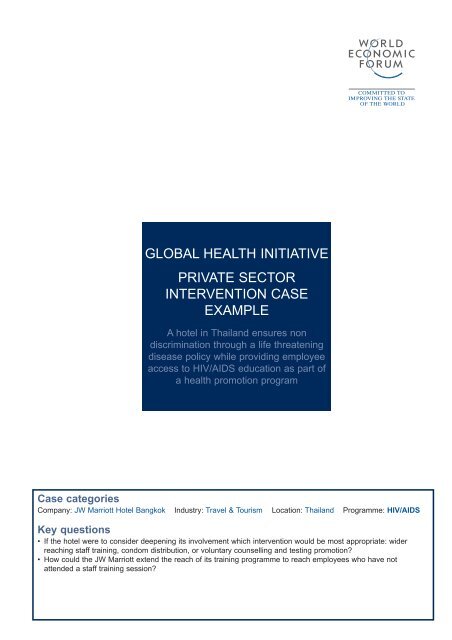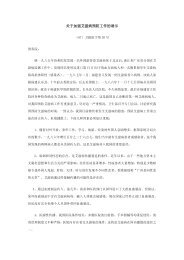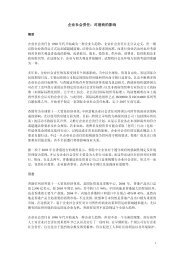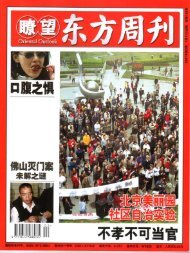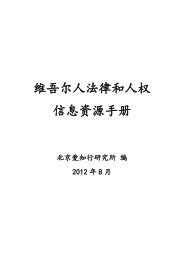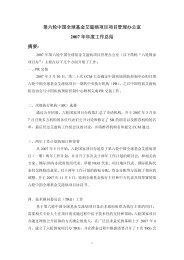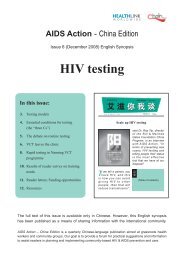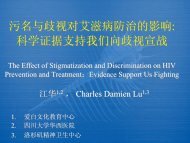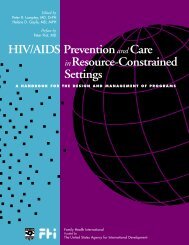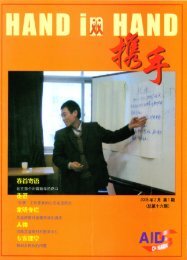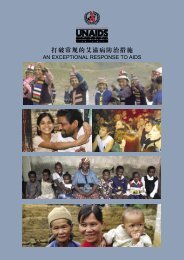JW Marriot Hotel's HIV Intervention Case Example
JW Marriot Hotel's HIV Intervention Case Example
JW Marriot Hotel's HIV Intervention Case Example
- No tags were found...
You also want an ePaper? Increase the reach of your titles
YUMPU automatically turns print PDFs into web optimized ePapers that Google loves.
GLOBAL HEALTH INITIATIVEPRIVATE SECTORINTERVENTION CASEEXAMPLEA hotel in Thailand ensures nondiscrimination through a life threateningdisease policy while providing employeeaccess to <strong>HIV</strong>/AIDS education as part ofa health promotion program<strong>Case</strong> categoriesCompany: <strong>JW</strong> <strong>Marriot</strong>t Hotel Bangkok Industry: Travel & Tourism Location: Thailand Programme: <strong>HIV</strong>/AIDSKey questions• If the hotel were to consider deepening its involvement which intervention would be most appropriate: widerreaching staff training, condom distribution, or voluntary counselling and testing promotion?• How could the <strong>JW</strong> <strong>Marriot</strong>t extend the reach of its training programme to reach employees who have notattended a staff training session?
Private sector intervention case exampleCompany: <strong>JW</strong> <strong>Marriot</strong>t Hotel Bangkok Industry: Travel & Tourism Location: Thailand Programme: <strong>HIV</strong>/AIDSPolicyPreventionandAwarenessProgramme description<strong>Marriot</strong>t International has a global policy for associates living with lifethreatening illnesses, including <strong>HIV</strong>/AIDS. The policy was last revised in June2000 and is available on the company intranet.• Non-discrimination: (1) employees will not be dismissed on the ground of their<strong>HIV</strong> status; and (2) hiring decisions will not utilize an <strong>HIV</strong> assessment.• Confidentially and disclosure: (1) employee is not required to disclose status;and (2) if status is disclosed, it cannot be disclosed to others without writtenconsent.• Benefits: (1) benefits are provided for employees; and (2) benefit packages donot discriminate by <strong>HIV</strong> status.• Ill-health retirement: (1) if an employee is too ill to perform his or her regularduties, the hotel will first look to reassign the employee to a job in the backoffice; (2) if the employee still unable to perform his or her job, the employee isencouraged to use up his/her annual vacation and sick leave; and (3) if theemployee is still medically unable to work, the hotel will consider, on a case bycase basis, keeping the employee on the payroll without pay to maintaineligibility for social security and company provided medical and life insurance;and (4) this policy is similar to how the <strong>JW</strong> <strong>Marriot</strong>t Hotel Bangkok handles allchronic illnesses.• Temporary workers: The hotel does not have an explicit contractor policy, butthey are welcome to attend any workplace health promotion activities.The <strong>JW</strong> <strong>Marriot</strong>t Hotel Bangkok launched its workplace prevention programmein 2001, which focused on integrating <strong>HIV</strong>/AIDS awareness and preventionmessages into its health promotion programme.• Starting in 2001, the <strong>JW</strong> <strong>Marriot</strong>t Hotel Bangkok started offering annualvoluntary <strong>HIV</strong>/AIDS awareness training sessions. Each interactive three hourclass is offered during normal working hours and includes between 30 and 40people. The hotel estimates that approximately 15% of its staff has gonethrough <strong>HIV</strong>-specific training since 2001. These training courses are part of abroader health promotion series which focuses on a different topic each quarterthat affects employee health and productivity. Some recent topics include:cholesterol and a well balanced diet and Hepatitis B.• <strong>HIV</strong>/AIDS-related staff training has been conducted by external groups includingthe Thailand Business Coalition on AIDS (TBCA) and the Wednesday Club ofthe Thai Red Cross. These courses covered the following topics: (1) statisticaloverview of <strong>HIV</strong>/AIDS; (2) <strong>HIV</strong> transmission exercise; (3) <strong>HIV</strong>/AIDS basic facts;(4) behaviour risk-exercise; (5) care and support for people living with<strong>HIV</strong>/AIDS; (6) dialogue with an <strong>HIV</strong>-positive person; (7) condom use; and (8)where to get additional information.• In 2003, the <strong>JW</strong> <strong>Marriot</strong>t Hotel Bangkok organized activities and donations tosupport <strong>HIV</strong>-positive children at Prabat-nam-phu, Lopburi province. Allassociates were invited to donate money or used belongings. On Valentinesday approximately 30 staff visited them, held a number of activities, and joinedthem for lunch.
Private sector intervention case exampleCompany: <strong>JW</strong> <strong>Marriot</strong>t Hotel Bangkok Industry: Travel & Tourism Location: Thailand Programme: <strong>HIV</strong>/AIDS<strong>Case</strong>-specific <strong>HIV</strong>/AIDS ResourcesDocuments<strong>Marriot</strong>t International Life Threatening Disease Policy (June 2000)Contacts<strong>Marriot</strong>t International<strong>JW</strong> <strong>Marriot</strong>t Hotel BangkokThailand Business Coalition on AIDS (TBCA)Asian Business Coalition on <strong>HIV</strong>/AIDS (ABC)International Labour OrganizationMr Regan TaikitsadapornArea Director of Human Resources, Asia,Australia, & New ZealandTel.: +852 2192 6033E-mail: regan.taikitsadaporn@marriott.comMr Peter CaprezGeneral ManagerTel.+66 2 656 7700E-mail: peter.caprez@marriotthotels.comDr Anthony PramualratanaExecutive Director, TBCATel.: +66 2 643 9891-3E-mail: tbca@ksc.net.thMr Simon GrahamAsia Regional Program ManagerTel.: +66 2 643 9891-3E-mail: simon@abconaids.orgMr Gunnar WalzholzTechnical Specialist on <strong>HIV</strong>/AIDS in the World ofWorkRegional Office for Asia and PacificTel.: +66 2 288 1765E-mail: walzholz@ilo.orgThis case study uses the following exchange rate: 44.5 Thai Baht to 1 United States Dollar.The World Economic Forum Global Health Initiative Private Sector <strong>Case</strong> example was written by Peter DeYoung and developedin collaboration with the featured company, however, GHI member companies and partners, the World Economic Forum and thecontributing company do not necessarily subscribe to every view expressed herein. The case is based on a self-reportingmodel. Although the GHI makes reasonable efforts to ensure the accuracy of the statements, this report should not be viewedas an external audit of the programme described.This case study is a part of the GHI’s <strong>Case</strong> Study and Supporting Document Library, which is available atwww.weforum.org/globalhealth/cases. Please contact the Global Health Initiative at the World Economic Forum for anyquestions, feedback or submissions related to this case study.World Economic Forum91-93 route de la CapiteCH-1223 Cologny/Geneva – SwitzerlandTel.: +41 (0) 22 869 1212Fax: +41 (0) 22 786 2744E-mail: globalhealth@weforum.orgwww.weforum.org/gobalhealth© 2004 World Economic ForumAll rights reserved.No part of this publication may be reproduced or transmitted in any form or by any means, including photocopying or by anyinformation storage and retrieval system without prior written consent.
The World Economic Forum is an independentinternational organization committed to improvingthe state of the world. The Forum provides acollaborative framework for the world's leaders toaddress global issues, engaging particularly itscorporate members in global citizenship.Incorporated as a foundation, and based inGeneva, Switzerland, the World Economic Forumis impartial and not-for-profit; it is tied to nopolitical, partisan or national interests. The Forumhas NGO consultative status with the Economicand Social Council of the United Nations.(www.weforum.org)


